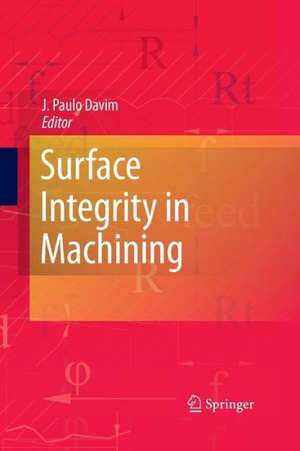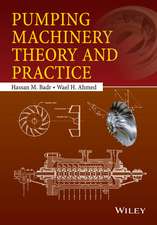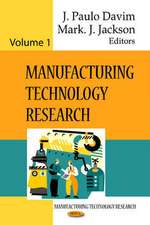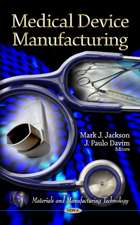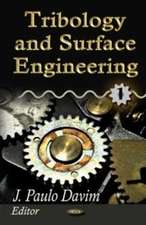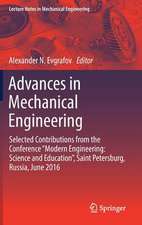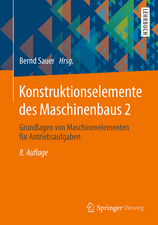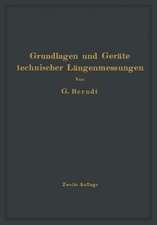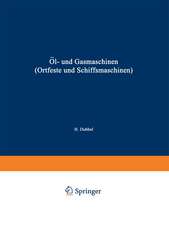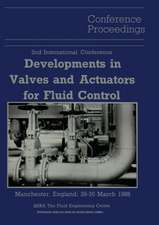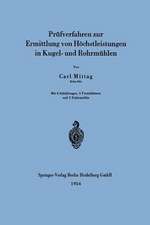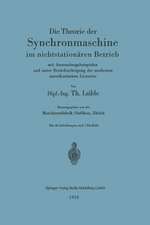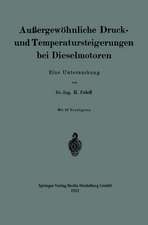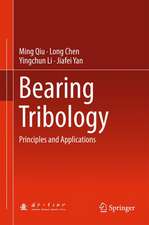Surface Integrity in Machining
Editat de J. Paulo Davimen Limba Engleză Paperback – 29 noi 2014
"Surface Integrity in Machining" gathers together research from international experts in the field. Topics covered include: the definition of surface integrity and its importance in functional performance; surface topography characterization and evaluation; microstructure modification and the mechanical properties of subsurface layers; residual stresses; surface integrity characterization methods; and surface integrity aspects in machining processes.
A useful reference for researchers in tribology and materials, mechanical and materials engineers, and machining professionals, "Surface Integrity in Machining" can be also used as a textbook by advanced undergraduate and postgraduate students.
| Toate formatele și edițiile | Preț | Express |
|---|---|---|
| Paperback (1) | 637.13 lei 6-8 săpt. | |
| SPRINGER LONDON – 29 noi 2014 | 637.13 lei 6-8 săpt. | |
| Hardback (1) | 641.71 lei 6-8 săpt. | |
| SPRINGER LONDON – 4 feb 2010 | 641.71 lei 6-8 săpt. |
Preț: 637.13 lei
Preț vechi: 749.56 lei
-15% Nou
Puncte Express: 956
Preț estimativ în valută:
121.95€ • 132.51$ • 102.51£
121.95€ • 132.51$ • 102.51£
Carte tipărită la comandă
Livrare economică 21 aprilie-05 mai
Preluare comenzi: 021 569.72.76
Specificații
ISBN-13: 9781447157489
ISBN-10: 1447157486
Pagini: 228
Ilustrații: XII, 215 p.
Dimensiuni: 155 x 235 x 12 mm
Greutate: 0.33 kg
Ediția:2010
Editura: SPRINGER LONDON
Colecția Springer
Locul publicării:London, United Kingdom
ISBN-10: 1447157486
Pagini: 228
Ilustrații: XII, 215 p.
Dimensiuni: 155 x 235 x 12 mm
Greutate: 0.33 kg
Ediția:2010
Editura: SPRINGER LONDON
Colecția Springer
Locul publicării:London, United Kingdom
Public țintă
ResearchCuprins
Surface Integrity – Definition and Importance in Functional Performance.- Surface Texture Characterization and Evaluation Related to Machining.- Residual Stresses and Microstructural Modifications.- Characterization Methods for Surface Integrity.- Surface Integrity of Machined Surfaces.- Surface Integrity of Micro- and Nanomachined Surfaces.
Recenzii
From the reviews:
“Its objectives are to provide all the means for clear understanding of the current state of the art, and to lay down a solid foundation for the further developments. … anyone involved in machining process design/development/research, quality control, and machines/structures reliability analysis/improvement will benefit greatly from reading this book. … this book can serve as a useful reference for academics, manufacturing and metal cutting researchers, mechanical, manufacturing and materials engineers, professional in related industries with metal cutting.” (Viktor P. Astakhov, International Journal of Machining and Machinability of Materials, Vol. 11 (1), 2012)
“Its objectives are to provide all the means for clear understanding of the current state of the art, and to lay down a solid foundation for the further developments. … anyone involved in machining process design/development/research, quality control, and machines/structures reliability analysis/improvement will benefit greatly from reading this book. … this book can serve as a useful reference for academics, manufacturing and metal cutting researchers, mechanical, manufacturing and materials engineers, professional in related industries with metal cutting.” (Viktor P. Astakhov, International Journal of Machining and Machinability of Materials, Vol. 11 (1), 2012)
Notă biografică
J. Paulo Davim received his PhD degree in Mechanical Engineering from the University of Porto in 1997 and the Aggregation from the University of Coimbra in 2005. Between 1986 and 1996, he was a lecturer at the University of Porto. Currently, he is an Aggregate Professor at the Department of Mechanical Engineering of the University of Aveiro and the Head of MACTRIB - Machining and Tribology Research Group. He has more 24 years of teaching and research experience in manufacturing, materials and mechanical engineering. He is the Editor in Chief of four international journals, Guest Editor, Editorial Board Member, Reviewer, and Scientific Advisor for many international journals and conferences. In addition, he has also published more than 250 articles in ISI journals (150 with h-index 14) and conferences.
Textul de pe ultima copertă
In machining, a surface can be defined as a border between a machined component and its environment. The term ‘surface integrity’ is used to describe the attributes of a machined surface and its relationship to functional performance. Surface Integrity in Machining describes the fundamentals and recent advances in the study of surface integrity in machining processes.
In general, surface integrity can be divided into two aspects: the external topography of surfaces (surface finish); and the microstructure, mechanical properties and residual stresses of internal subsurface layers. Performance characteristics that are usually sensitive to surface integrity include; fatigue strength, fracture strength, corrosion rate, and tribological behavior (such as friction, wear and lubrication, and dimensional accuracy).
Surface Integrity in Machining gathers together research from international experts in the field. Topics covered include: the definition of surface integrity and its importance in functional performance; surface topography characterization and evaluation; microstructure modification and the mechanical properties of subsurface layers; residual stresses; surface integrity characterization methods; and surface integrity aspects in machining processes.
A useful reference for researchers in tribology and materials, mechanical and materials engineers, and machining professionals, Surface Integrity in Machining can be also used as a textbook by advanced undergraduate and postgraduate students.
In general, surface integrity can be divided into two aspects: the external topography of surfaces (surface finish); and the microstructure, mechanical properties and residual stresses of internal subsurface layers. Performance characteristics that are usually sensitive to surface integrity include; fatigue strength, fracture strength, corrosion rate, and tribological behavior (such as friction, wear and lubrication, and dimensional accuracy).
Surface Integrity in Machining gathers together research from international experts in the field. Topics covered include: the definition of surface integrity and its importance in functional performance; surface topography characterization and evaluation; microstructure modification and the mechanical properties of subsurface layers; residual stresses; surface integrity characterization methods; and surface integrity aspects in machining processes.
A useful reference for researchers in tribology and materials, mechanical and materials engineers, and machining professionals, Surface Integrity in Machining can be also used as a textbook by advanced undergraduate and postgraduate students.
Caracteristici
Describes the fundamentals and recent advances in the study of surface integrity in machining processes Written by a collection of international experts in the field Includes supplementary material: sn.pub/extras
